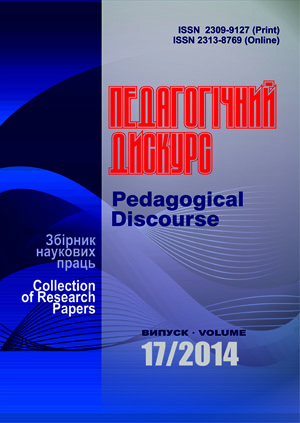Essence and Structure of the Notion «Law Competence» of the Future Engineers
Abstract
Essence and structure of concept «Law competence» are examined in the article. The components of law competence are outlined, in particular: value-orientation, communicative competence. The level of legal competence is shown, namely the everyday level (primary) that appears in the actions, actions in accordance with the logics of their legal competence, the practical application of knowledge in the law space and theoretical level. The conditions of formation of legal competence of the future specialist are the priority values, motivational guidelines, the law culture of the state, the level of law education of students, legality and law and order in the sphere of social environment of the individual. Such key qualities that belong to legal competence are highlighted: adaptive (that allows to adapt in certain legal space); communication (process matching matters of professional activity with existing legislation and law); law (impotent operate law categories); socio-cultural (knowledge of the history of consciousness, law, laws of their development, links with other forms of public consciousness, peculiarities of functioning); predictive (ability to foresee the development of a specific situation, see the problems that occur, the consequences, and finding them the right decision from the point of view of legislation). Based on the foregoing, the legal competence of engineers selected the following key competences: value, informational-cognitive, thinking-speech, dedicated, technologically-regulatory, creatively-predictive.
Downloads
References
Kacova L. I. Formuvanna profesiinogo interesu u maibutnih ucheteliv u proctsi pedagogichnoi praktuku: avtoreferat na zdobutta naukovogo stupena doktora pedagogicheskih nauk: 13.00.08 «Teoriya i metodika profesionalnogo obrazovaniya». Harkiv, 2005, 19 p.
Klochkova D. M. Osnovni kruterii formuvanna pravovoi kompetentnosti maibutnogo vchutela. Visnuk LMU imeni Tarasa Shevchenka. Lugansk, 2009, № 23 (186), Chast 3, pp. 207-212.
Levitan K. M. Osnovu pedagogicheskoi deantologii. Moskva,1994, 192 p.
Mayorova E. B. Komponentu gotovnosti rukovoditela k upravlencheskoi deyatelnosti v usloviyah finansovo-ekonomicheskoi samostoyatelnosti obrazovatelnogo uchreshdeniya. Vestnik uneversiteta rossiiskoi akademii obrazovaniya. Moskva, 2008, № 3 (41), pp. 67-72.
Novikov A. M. Metodologiya obrazovaniya. Moskva, 2006, 488 p.
Nutten Sh. Motivacuya, deistvie i perspektiva budushego. Moskva, 2004, 608 p.
Panova O. A. Formirovanie pravovoi kompetentnosti pedagogov sovremennoi shkolu: avtoreferat na soiskanie ychonoi stepeni kandidata pedagogicheskih nauk: 13.00.01 «Obshaya pedagogika, istoriya pedagogiki i obrazovaniya. Moskva, 2002, 19 p.

This work is licensed under a Creative Commons Attribution-NonCommercial-ShareAlike 4.0 International License.

















